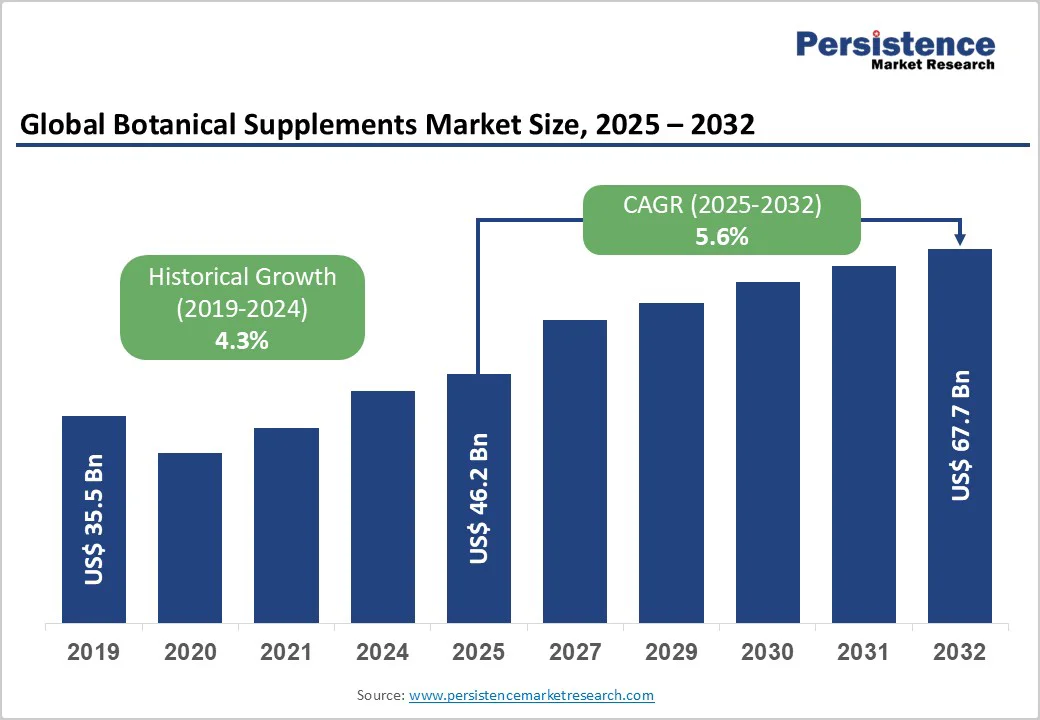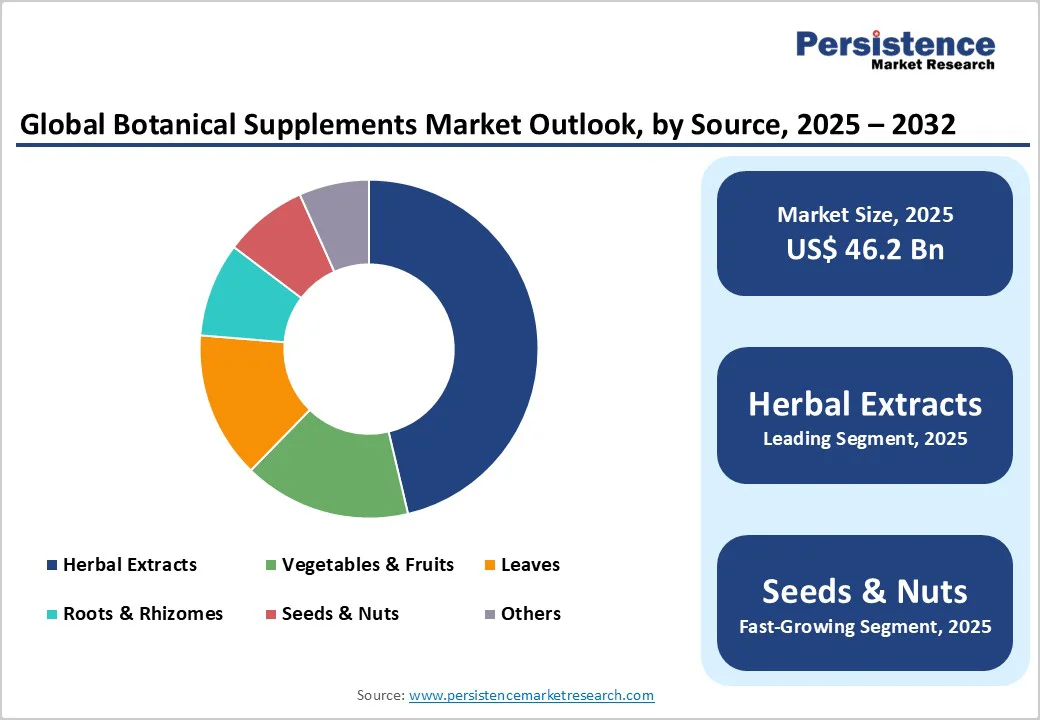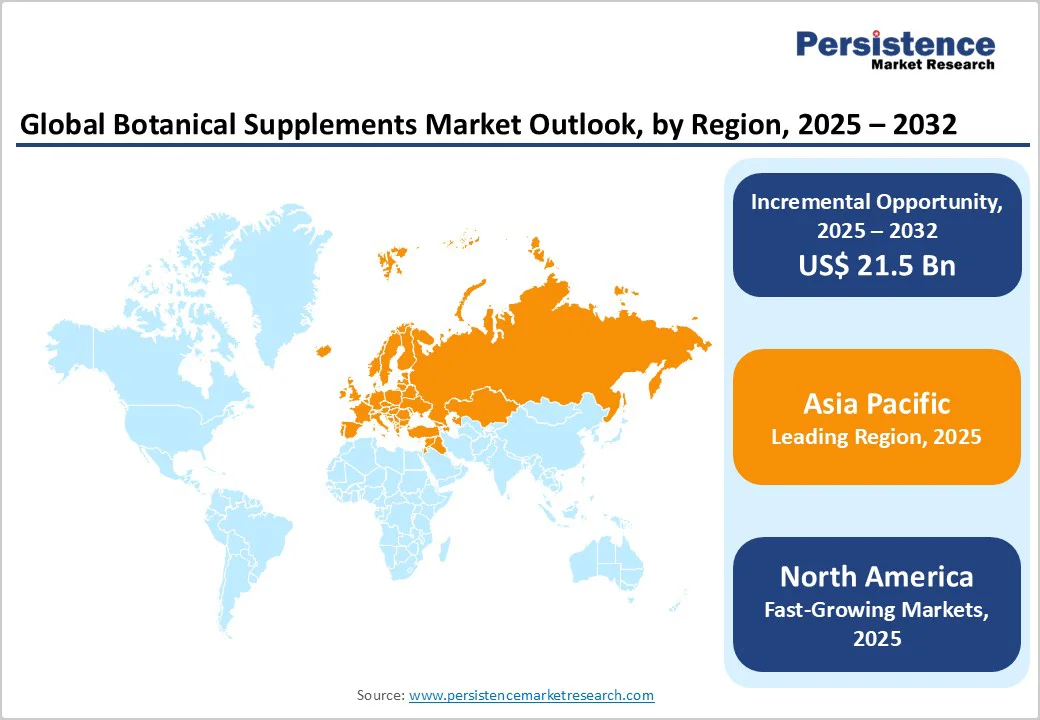ID: PMRREP2797| 191 Pages | 4 Nov 2025 | Format: PDF, Excel, PPT* | Food and Beverages

The global botanical supplements market size is likely to value at US$ 46.2 billion in 2025 and is projected to reach US$ 67.7 billion by 2032, growing at a CAGR of 5.6% during the forecast period from 2025 to 2032.
| Key Insights | Details |
|---|---|
|
Global Botanical Supplements Market Size (2025E) |
US$ 46.2 Bn |
|
Market Value Forecast (2032F) |
US$ 67.7 Bn |
|
Projected Growth (CAGR 2025 to 2032) |
4.3% |
|
Historical Market Growth (CAGR 2019 to 2024) |
5.6% |

Rising consumer preference for plant-based, chemical-free alternatives is redefining the growth trajectory of the global botanical supplements industry. A growing number of individuals are shifting away from synthetic formulations toward products derived from natural herbs, fruits, and plant extracts, which are perceived as safer and more sustainable. As per research studies, around 69% of consumers choose botanical supplements to support their general wellness, underscoring the widespread trust in nature-based health solutions. This behavioral shift aligns with the broader clean-label and holistic wellness movements, where transparency, eco-conscious sourcing, and reduced chemical exposure drive purchasing decisions.
Manufacturers are responding by expanding portfolios with vegan-certified, non-GMO, and organically cultivated botanicals, reinforcing the market’s evolution toward purity, efficacy, and environmental responsibility.
Inconsistent raw material purity has become a critical challenge restraining the global botanical supplements market. Variations in the quality, potency, and authenticity of plant-derived ingredients compromise product reliability and weaken consumer confidence. Adulteration, pesticide residues, and poor post-harvest handling are recurring issues that reduce the therapeutic effectiveness of supplements.
Without stringent quality control and standardized sourcing, brands risk regulatory backlash and damaged credibility among increasingly discerning consumers. The lack of global harmonization in testing protocols further complicates supplier verification across regions. As awareness around purity and traceability rises, manufacturers are being pushed to invest in DNA barcoding, blockchain-based sourcing, and third-party testing to ensure consistency, safeguard brand reputation, and rebuild long-term trust in botanical wellness products.
Transparency and traceable sourcing are emerging as powerful differentiators in the global botanical supplements market, enabling brands to command premium positioning. Consumers are increasingly demanding visibility into where and how botanical ingredients are grown, harvested, and processed. Companies that provide verifiable sourcing data, sustainability certifications, and ethical supply chain documentation are building stronger emotional connections and loyalty among wellness-conscious buyers.
Startups are leveraging blockchain technology and QR-coded packaging to showcase full ingredient provenance, appealing to tech-savvy and environmentally aware consumers. For established players, transparent sourcing enhances credibility and mitigates risks associated with adulteration scandals. As clean-label movements accelerate, traceability is evolving from a compliance feature into a strategic value proposition, turning authenticity, purity, and sustainability into cornerstones of competitive advantage.
Herbal extracts hold approximately. 46% market share as of 2024, underscoring their dominance in the global botanical supplements market due to their high concentration of bioactive compounds and proven therapeutic efficacy. Consumers value these extracts for consistent potency, ease of formulation, and science-backed benefits supporting immunity, stress management, and cognitive health.
Vegetables and fruits are gaining attention for their antioxidant-rich profiles and versatility in gummies, beverages, and capsules. Leaves such as moringa and mint are recognized for detoxification and metabolic support, while roots and rhizomes such as turmeric and ginseng continue to drive demand for anti-inflammatory and energy-enhancing supplements. The rising consumer preference for standardized herbal extracts reflects a shift toward measurable efficacy and clean-label health optimization worldwide.
Stress and energy support is projected to achieve a positive CAGR during the forecast period, driven by increasing mental fatigue and lifestyle-related stress among global populations. Consumers are turning toward botanical formulations containing adaptogenic herbs such as ashwagandha, rhodiola, and ginseng to enhance resilience, restore vitality, and support cognitive focus.
The growing preference for natural alternatives to synthetic stimulants is accelerating demand for plant-based energy supplements that promote balanced, sustained performance. The rise of hybrid work cultures and digital fatigue has further reinforced the importance of stress-relief and energy-enhancing botanicals in daily wellness routines. Brands are investing in clinically validated adaptogen blends and functional beverage formats, positioning this segment as a cornerstone of holistic mental and physical well-being.

Asia Pacific Botanical Supplements Market holds approximately 36% share in the global market, driven by a deep-rooted tradition of herbal medicine and accelerating modern wellness adoption. In China, consumers are gravitating toward traditional botanicals such as ginseng, goji berry, and astragalus, increasingly formulated into functional beverages and capsules. India’s Ayurvedic heritage is fueling strong demand for turmeric, tulsi, and ashwagandha-based supplements, supported by government-backed wellness initiatives.
Japan’s aging population is propelling interest in botanicals promoting vitality and longevity, including green tea extracts and reishi mushrooms. Singapore is emerging as a regional innovation hub, emphasizing clean-label, science-backed formulations catering to urban professionals. The region’s blend of cultural familiarity with herbal products and rising trust in clinically validated natural ingredients is sustaining strong market momentum.
North America Botanical Supplements Market is expected to achieve a positive CAGR driven by the region’s evolving focus on preventive health, clean-label nutrition, and functional botanicals. In the U.S., consumers are increasingly turning to adaptogenic herbs such as ashwagandha, ginseng, and rhodiola to manage stress, fatigue, and cognitive balance amid fast-paced lifestyles.
The market is witnessing a rapid expansion in botanical gummies, capsules, and infused beverages positioned around mood, sleep, and energy support. In Canada, demand for sustainably sourced and certified-organic botanical supplements is gaining ground, with growing retail visibility in pharmacies and online wellness platforms. The surge in consumer preference for clinically studied, plant-derived formulations underscores a wider shift toward natural, transparent, and holistic wellness regime across North America.

The global botanical supplements market is moderately fragmented, with a mix of multinational nutraceutical firms and emerging startups competing through innovation, authenticity, and sustainability. Leading companies are investing in advanced extraction technologies such as supercritical CO? and cold-pressing to preserve bioactive compounds and enhance product efficacy.
Vertical integration is becoming a defining strategy, with players securing direct access to farms to ensure traceability and consistent quality. Startups are emphasizing certified-organic, non-GMO, and fair-trade botanicals to attract ethically minded consumers. Regulatory tightening around ingredient purity and labeling transparency is compelling firms to pursue certifications like GMP, USDA Organic, and ISO standards. The market’s evolution reflects growing alignment between science-driven formulation, clean sourcing, and consumer trust in natural wellness solutions.
The global botanical supplements market is likely to value US$ 46.2 Bn in 2025.
Rising consumer preference for plant-based, chemical-free alternatives is driving growth in the global botanical supplements market.
The global botanical supplements market is poised to witness a CAGR of 5.6% between 2025 and 2032.
Transparency and traceable sourcing offer a key market opportunity by enabling brands to establish premium positioning and stronger consumer trust.
Major players in the global botanical supplements market include Himalaya Wellness Company, Dabur India Ltd., Amway Corporation, NOW Health, Herbalife Nutrition Ltd., Nature's Best, and others.
| Report Attribute | Details |
|---|---|
|
Historical Data/Actuals |
2019 - 2024 |
|
Forecast Period |
2025 - 2032 |
|
Market Analysis |
Value: US$ Bn |
|
Geographical Coverage |
|
|
Segmental Coverage |
|
|
Competitive Analysis |
|
|
Report Highlights |
|
By Source
By Form
By Function
By Sales Channel
By Region
Delivery Timelines
For more information on this report and its delivery timelines please get in touch with our sales team.
About Author